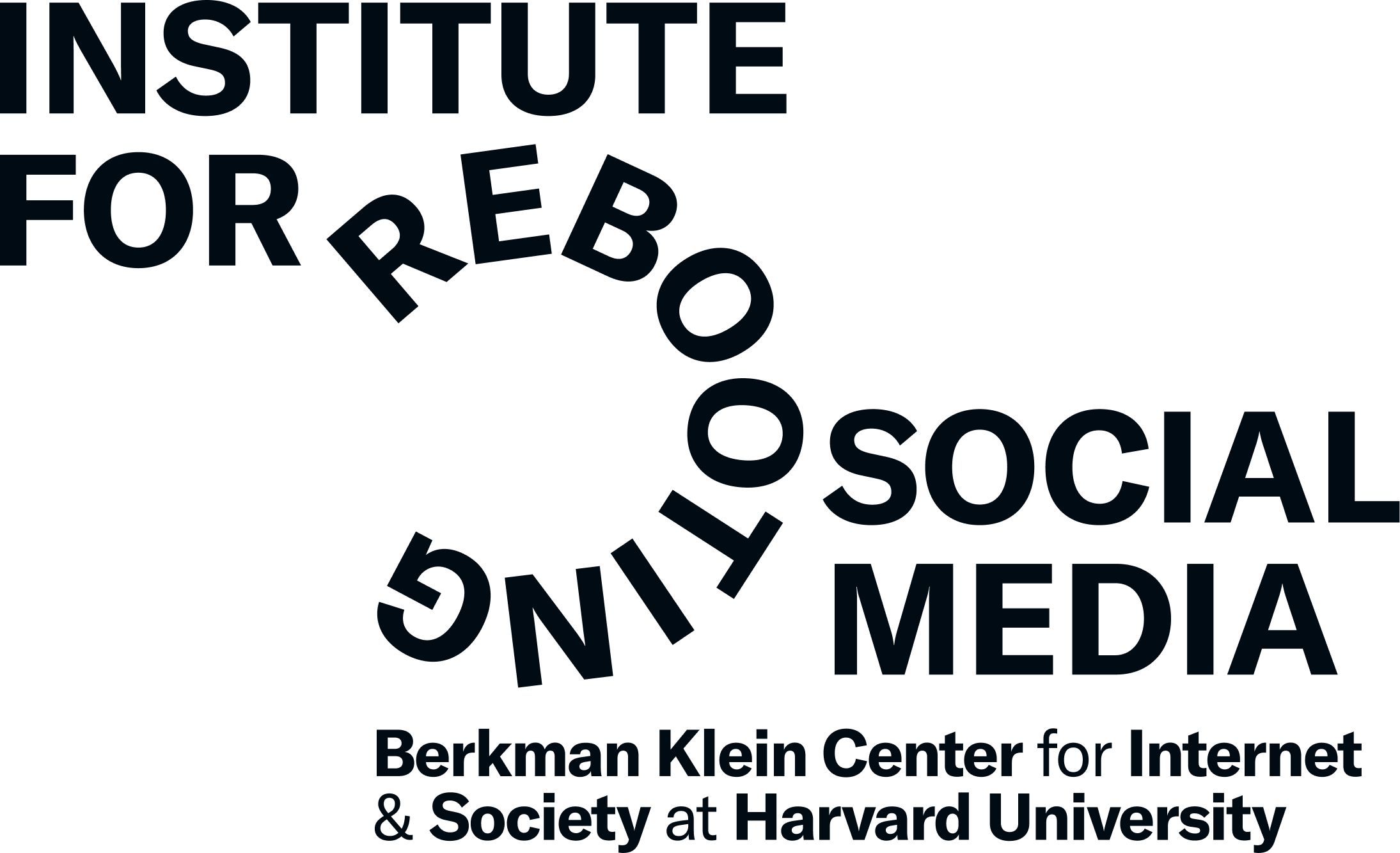


One Year Later: Experts Reflect on TikTok Divest-or-Ban Order
The TikTok divest-or-ban order was signed one year ago. The Institute for Rebooting Media spoke with researchers and legal experts to learn about the order’s impact on expression, governance, and the business of social media over the last year.
On April 24, 2024, the Biden Administration signed the Protecting Americans from Foreign Adversary Controlled Applications Act, calling on ByteDance, the Chinese-based owner of TikTok, to divest ownership of the app to a US-approved buyer by January 19, 2025 or face a nationwide ban. The Act, known colloquially as the divest-or-ban order, has since faced a series of obstacles, including a change of administration, a challenge in the US Supreme Court, an approximately 12-hour shutdown of the app, and two extensions for the divestiture–including the most recent 75-day extension passed by executive order on April 4, 2025.
In a post on Truth Social after the second extension, President Trump wrote that the deal “requires more work to ensure all necessary approvals are signed” but insisted that his administration has made “tremendous progress” toward striking a deal with China. Meanwhile, the Trump Administration has enacted tariffs against China that have allegedly created more of a strain on divestiture negotiations.
To mark the order’s one-year anniversary, and to complement a piece produced last year, the Institute for Rebooting Social Media spoke with its network of regulatory experts and researchers to learn more about what this on-again, off-again ban has meant for free speech, governance, and the business of social media.
The content below has been edited for length, grammar, and clarity.
Respondents
Anupam Chander, Scott K. Ginsburg Professor of Law and Technology at Georgetown University; 2023-2024 RSM Visiting Scholar; BKC Faculty Associate
David Craig, Associate Professor of Communication at the University of Southern California; 2023-2024 RSM Visiting Scholar; BKC Faculty Associate
Tom Divon, Creators & Platforms Researcher; Co-Founder of The Content Creator Scholars Network
Jabari Evans, Assistant Professor of Race and Media at the University of South Carolina; 2022-2023 RSM Visiting Scholar; BKC Faculty Associate
Jordan Furlong, Former Product Manager of Digital Wellbeing at TikTok; BKC Affiliate
Nathaniel Lubin, Founder of Better Internet Initiative; 2022-2023 RSM Assembly Fellow; BKC Affiliate
The divest-or-ban order was signed a year ago citing national security concerns–particularly that China could force ByteDance to hand over user data or use the app to spread propaganda. What have we learned about the order’s impact on free speech, national security, and the social media landscape?
Anupam Chander (Georgetown Law School): The last year has shown us that the national security concerns were a little overwrought. The whole process has become a farce, and I think we should think about how much power and deference we’ve given to the President on national security claims. That should give us pause about speech in the country.
Tom Divon (Content Creator Scholars Network): Over the past year, we’ve learned everything except what this was supposedly about: national security. It’s become clear that the divest-or-ban order is less about actual risks and more about power, race, and political performance. The idea that TikTok uniquely threatens US interests, while Meta continues their data practices largely unchecked, reveals a double standard rooted in racialized suspicion of China. It shifts the focus away from actual harms and places it squarely in geopolitical posturing. And yes, free speech concerns are absolutely real, not because TikTok is inherently democratic, but because the US has yet to establish a transparent approach to platform governance across the board.
David Craig (USC Annenberg): The claims that TikTok was almost singularly responsible for creating precarious conditions around cybersecurity have never been proven. The information that the government says proves these claims has either been redacted or never shown publicly, so we have no clear evidence that this is the case–even as the government has started to entertain other forms of platform moderation, governance, and control, particularly around China’s e-commerce platforms Shein and Temu. I think these are all reasons for people who’ve been watching this process to be very suspicious of the justifications that the US is giving for wanting to shut these platforms down.
Jabari Evans (University of South Carolina): TikTok is truly the pulse of contemporary creator culture. Creators that I have been in communication with have still expressed their ambivalence over what comes next for them. Small business owners, comedians, musicians, food bloggers and even journalists have told me that they were in danger of losing over half of their income if this ban goes through. They are still stuck in limbo.
Jordan Furlong (former TikTok): Look, a year into this whole saga, I think we’ve mostly learned that tech policy is complicated. The order itself hasn’t necessarily made anyone safer so far, but it’s definitely sparked important conversations about data sovereignty and platform governance. What’s interesting is how it exposed this tension between national security concerns and free expression, which are both valid yet clashing priorities.
We are now in the second 75-day extension for ByteDance. What might these extensions indicate about the US government’s attitude around TikTok and the current state of negotiations with China?
Jabari Evans (University of South Carolina): It’s clear that our government understands that this platform has a tremendous amount of value to American citizens. It is also clear that our President grasps the power of social media platforms to boost our economy, influence massive audiences, and shape public discourse. I think the extensions are indicative that they want to make a solution that works for our country’s future, but also allows continuity for those who rely so heavily on the app to maneuver their everyday lives.
Tom Divon (Content Creator Scholars Network): These repeated extensions signal an acknowledgment that TikTok is already deeply embedded in US markets. I think US lawmakers understand the political cost of banning a platform with such massive reach, culturally and economically. It was never about shutting TikTok down, but rather about ensuring American control over it. The government wants to appear tough on China, escalating pressure while avoiding the backlash that would come from pulling TikTok overnight. It’s largely performative, especially with Trump stepping back into the spotlight. He’s using TikTok both as a scapegoat and a campaign tool. Political commentators have pointed out that Trump’s narrative arc — from attacking the platform to “saving” it — was a calculated move. By stepping in at the last minute as TikTok’s “savior,” he gave himself symbolic ownership over the platform, and what’s worrying is that TikTok publicly acknowledged and thanked him. That’s massive in terms of political capital and influence.
Jordan Furlong (former TikTok): These extensions basically tell us that nobody has a clean solution yet. The US government doesn’t actually want to ban TikTok if they can avoid it since it’s politically risky and technically complicated. They’re hoping ByteDance blinks first and China’s not making it easy either with their export restrictions on algorithms. My read is that both sides are buying time so they can figure out some creative ownership structure.
Anupam Chander (Georgetown Law School): I think there are a number of reasons why President Trump has kept the app going for another 75 days, but one is that it makes a deal to sell the app much more financially possible. It’s much more attractive to buy something that actually works rather than something where people have already left and found alternatives.
Ahead of the original deadline for the ban, we saw a migration of American users over to a Chinese-owned app called RedNote. How has this migration impacted the user and/or creator experience? Has this migration raised any new national security concerns?
Tom Divon (Content Creator Scholars Network): The brief migration to RedNote revealed something crucial: with creators being creators, they instinctively chased visibility, reach, and voice, and did not prize national affiliation. What’s even more telling is that we saw many creators posting videos mocking the outrage, proudly saying they’re fine giving their data to a Chinese-owned app if it means staying visible for their communities. They ridiculed the American panic, with some referencing the infamous congressional hearings where underinformed lawmakers fumbled basic questions about TikTok, turning the spectacle into a meme. That performative nationalism doesn’t hold up when creators just want engagement. It’s clear that banning TikTok won’t address the root issues around data, governance, or accountability.
David Craig (USC Annenberg): The migration over to RedNote was a symbolic act of protest by people who are furious at the US trying to impose this regulation under false pretenses, and it was mainly by users of TikTok who were adamant that we have freedom, we have rights, and we want to go and use whatever platforms we want. But it was very limited in terms of viability. It was a bit like a fad. The biggest reason it wasn’t sustainable is because it was not necessarily a viable way for creators to operate. RedNote is the same platform in China as it is outside of China, which means anyone who uses it has to also conform to all of the social, cultural and political limitations on the platform.
Anupam Chander (Georgetown Law School): RedNote is an app that’s actually run from China and heavily censored by the Chinese owners of the app, which means that your data flows directly to China. All the things that Congress was worried about theoretically for TikTok are actually in place with RedNote. So the great irony of the TikTok law is that it would have moved people to a more insecure social media platform. And Americans knew exactly what they were doing, but they were willing to do it. The move also showed the ridiculousness of the TikTok law and how, eventually, you’d have to keep on banning more and more apps; it wouldn’t just stop with TikTok.
Jabari Evans (University of South Carolina): The creators that I typically research, those who are Black, urban, and oftentimes disadvantaged, haven’t migrated at all. They have turned to subscription-based services like Patreon, Substack and OnlyFans. They also have doubled down on YouTube content.
We’ve already seen what a TikTok ban looks like, even though it was for fewer than 24 hours. What have creators learned from that brief ban, and how do you think it has shaped conversations and behaviors online generally?
David Craig (USC Annenberg): This is the lesson that every previous generation of creators have learned: you don’t build your mansion in someone else’s backyard. Rather, you build mansions in every backyard you can. Creators have known that to build sustainable careers, they must operate across multiple platforms and modalities. That has been a big boost to other platforms like Instagram Reels and YouTube Shorts, but creators are also being quite imaginative, and there’s a whole wave of investment in the creator economy by people who want to build out new apps that help creators better monetize and manage their communities across multiple platforms.
Jabari Evans (University of South Carolina): Creators, even those with large audiences, see how quickly their livelihood can be taken from them. They have started to make contingency plans and they are understanding the need to have ownership of their intellectual property. The effects of a potential ban are uneven. Platforms like YouTube and messaging apps, which aren’t subject to the same restrictions, may see an influx of youth users. This migration will create loopholes in enforcement and advantage certain platforms over others. And let’s not overlook how race and class intersect with these regulations. Marginalized creators, who rely on grassroots support and relatability, will face heightened challenges compared to well-resourced influencers who can more easily adapt.
Ultimately, any real ban of TikTok would signal a pivotal moment in the evolution of digital culture. It would highlight critical questions about safety, responsibility, and access in the online world. But as we protect young users, we must also confront the unintended consequences: Who gets left behind in this new digital era? How do we ensure fairness in a clout economy that’s already riddled with inequalities?
Nathaniel Lubin (Better Internet Initiative): It had a pretty profound effect. I do think it was clear to creators before and during that period that there is instability in this work, and that there is personal and professional risk in being associated with individual platforms that they don’t have control over. That’s not a new observation; and these creators are sophisticated operators on their platforms, for the most part. But that’s different than actually experiencing it and seeing it up close, and I would say the ban pushed the uncertainty into peoples’ faces more directly.
Tom Divon (Content Creator Scholars Network): Although the ban never felt fully real to many creators, the 24-hour blackout was a wake-up call. Creators are already navigating a lot. This wasn’t their first encounter with losing access or facing the precarity of digital labor. But it was a stark reminder of just how much state politics can shape their ability to reach audiences. The brief ban sparked anxiety, platform-hopping, and emergency planning. Whether it becomes a lasting lesson in spreading creative energy across platforms remains to be seen, but for many, it already has.
More importantly, it deepened creator distrust in governments that use “national security” as a blanket excuse for control. I think those fears have only resurfaced now, especially with Trump’s shadow looming over the platform. Many LGBTQ+ creators are reporting more flagging, increased invisibility, and suppression; concerns they directly tie to the political atmosphere.
Do you think TikTok could ever be banned in the US for good?
Jordan Furlong (former TikTok): I don’t think TikTok will be banned permanently. The political and economic costs would be too high, and there’s too much incentive for all parties to find some compromise. What’s more likely is a complex restructuring that gives American investors and entities more control over US operations while letting ByteDance maintain some economic interest.
Jabari Evans (University of South Carolina): No, I don’t. However, I think that a legitimately US-founded competitor will emerge.
David Craig (USC Annenberg): I do. I just think that’s a reflection of how irrational things are right now in the US.
Nathaniel Lubin (Better Internet Initiative): I think it could be, but I don’t think it will be.
Anupam Chander (Georgetown Law School): I think the Trump Administration is unlikely to want TikTok to be banned because of his promise to save the app during the election, and because he thinks the app might benefit him.
Tom Divon (Content Creator Scholars Network): As long as TikTok can be leveraged as a megaphone, scapegoat, or stage, it will remain. The moment that changes, all bets are off.
Final thoughts from the respondents.
Jabari Evans (University of South Carolina): Platforms like TikTok have become pathways to fame and economic opportunity. For teens in marginalized communities, becoming a TikTok creator represents an accessible dream: turning their creativity into clout and clout into a career. But while these aspirations are valid, they are fraught with challenges. The creator economy is still unequal—Black creators face algorithmic bias, under-compensation, and fewer brand opportunities. Their talent and visibility don’t always translate to financial stability or long-term success. The question becomes: How can we ensure that these teens have the resources, representation, and fair opportunities to thrive in an economy that they actively shape?
David Craig (USC Annenberg): We’re facing the balkanization of the Internet. We’re looking at two competing platform systems that could ultimately lead to one world and two Internets. And I think we can all agree that is a spectacularly bad idea because we are not two civilizations or two worlds. We are one planet with a lot of major existential problems on our plate, and if we are no longer able to communicate, exchange ideas, or identify the ways in which we all belong to one planet, we’re looking at something spectacularly fraught.
Tom Divon (Content Creator Scholars Network): The US debate over a TikTok ban is just one part of a larger story. The platform operates across hundreds of countries, each shaped by its own sociopolitical dynamics. While US discourse centers on data and ownership, elsewhere the challenges are rooted in deeply entangled questions of morality, governance, and everyday survival. In the Middle East, creators have been arrested for content deemed disrespectful to cultural norms, the state, or the ruling regime—sometimes simply for dancing or for how they’re dressed in a video. These are not speculative threats, but the everyday costs of visibility. And yet, TikTok rarely responds with the same urgency, and shies away from responsibility in politically precarious environments. This is part of the bigger story: platforms like TikTok operate as global infrastructures, but our conversations remain overwhelmingly US-centric. Whether it’s censorship framed as US national security, or direct state repression elsewhere, we can’t afford to treat these cases in isolation.
Jordan Furlong (former TikTok): What’s frustrating about this whole situation is that we could have avoided this mess with some forward thinking. We should establish clear operating procedures with proper oversight to address valid national security concerns. Create a transparent framework that applies to all platforms handling American data, not just the foreign-owned ones. Set up an independent oversight body with actual technical expertise that can audit data practices and algorithms without disrupting business operations or punishing users. This approach seems like a win-win-win where the government gets its security assurances, companies get regulatory clarity, and users keep their apps without the drama.


